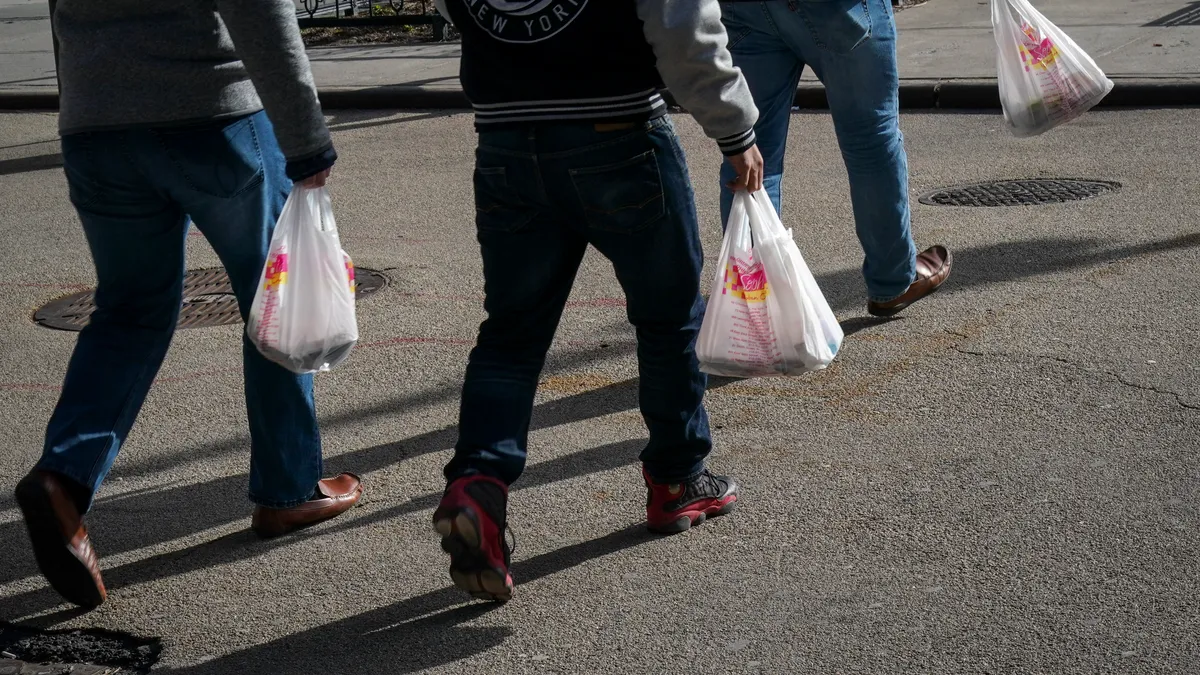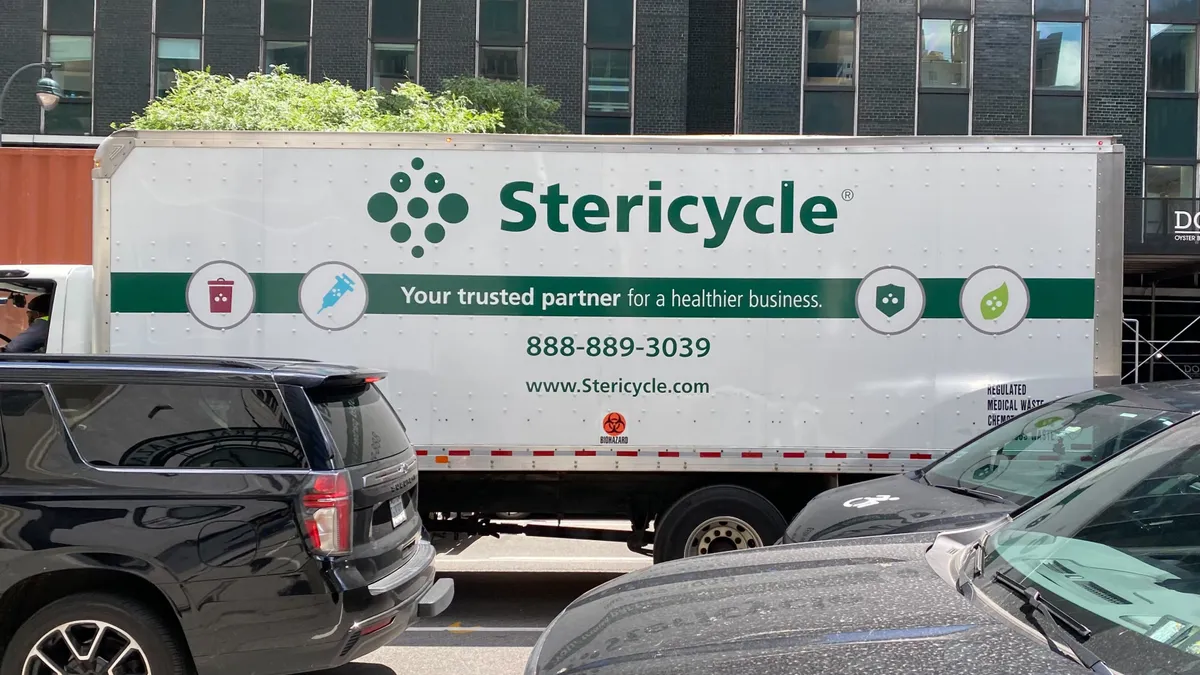Editor’s Note: Waste and recycling are inherently local issues in the United States, and we’re looking for new ways to highlight how these stories fit into broader trends. Send us your tips or feedback at waste.dive.editors@industrydive.com.
Municipal recycling leaders convene at WasteExpo
WasteExpo this week brought together public works and municipal recycling officials from across the country, creating the opportunity to discuss — in person — lessons from the last year, implementing technology and reducing contamination.
Recycling tonnage rose 22% in 2020, according to Atlanta Solid Waste Director Kanika Greenlee. With that increase in material, costs for labor, fuel and equipment added up. “Working for the city, you have to educate your elected officials about what the true costs for services are. Sometimes they don't want to hear that. But it's our job to at least make them aware of the challenges that we're facing in the industry,” she said.
Similarly, Ron Romero, operations division manager at Austin Resource Recovery, said that city residents’ high enthusiasm for the recycling program has also created strain. “We didn't have enough equipment to handle the tonnage changes, and we didn't have enough labor to handle what we were going through. But we were happy to see the participation numbers,” which Romero said fluctuate between 80% and 83%.
As for adoption of various technologies to help with some of those challenges, as well as with safety, operational efficiency and 311 integration, several municipal leaders noted those efforts remain a work in progress.
Phoenix Assistant Public Works Director Joe Giudice said that municipalities can and should communicate with private companies, which are sometimes farther along on this front. “I think there's a lot to learn from private industries when it comes to technology ... they're, in my experience, very willing to share with us what they're doing. They don't want to share with the competitors, but they're willing to [share with us.]”
Romero echoed the value of communication among peers. “If you don’t have to reinvent the wheel, you don’t have to reinvent the wheel,” he said.
Recycling contamination continues to vex cities, although a number of initiatives have helped, from cart tagging to social media outreach. But the last year proved tough with so many more people home during the pandemic.
“We have seen, I think, exponentially more ridiculous things in the carts during COVID,” said Gayle Love, senior division director of public information and outreach in the Miami-Dade County Department of Solid Waste Management, during a separate panel Wednesday.
July 1 marks go-live date for numerous plastic bag laws
The Northeast is set to see numerous city and state laws restricting single-use plastic bags take effect on Thursday. Some of those laws were supposed to have earlier start dates but were delayed during the COVID-19 pandemic, with officials citing additional strain to businesses during an already stressful time.
At the state level, Maine and Connecticut both have plastic bag ban laws scheduled to take effect Thursday. Meanwhile, lawmakers in Delaware this week approved changes to a ban that began in January. The changes mean that beginning next July, bags will have to be thicker in order to be considered reusable.
As for municipal bans, Philadelphia’s law restricting distribution of single-use plastic and paper bags not made of at least 40% recycled content is taking effect, but will not be fully enforced until April of next year.
Bans could proliferate in the state, as the Pennsylvania legislature is poised to not renew a statewide preemption on local single-use plastics ordinances.
“Municipalities must be empowered to address issues of plastic pollution when the state legislature won’t. Our local governments deal with the brunt of plastic pollution,” Stephanie Wein, PennEnvironment’s clean water and conservation advocate, said in a statement.
“We know Pennsylvania’s local leaders want to take on plastics pollution. If the legislature won’t tackle the plastics crisis, they should get out of the way.”
That could clear the way for Pittsburgh, which passed a resolution of intent in May to ban plastic bags in the future.
Also beginning Thursday in Denver is a 10-cent charge for plastic carryout bags in many locations. The state legislature this month sent a bill to the governor that would largely ban plastic bags beginning in 2024.
Baltimore Mayor Brandon Scott also recently announced that the city’s bag ban, which would have taken effect in January but was pushed to July 9 to give retailers more time to comply, would be further delayed until Oct. 1.
More news from around the country:
-
Labor shortages in the waste industry are affecting some of the most major cities in the U.S. Dallas said this week it will delay residential recycling pickup by one to two days for the next few weeks. "We thought coming out of the pandemic, it would return back to normal and we would get people hired … We just did not come out of it as quickly as we expected," said Dallas Sanitation Services Interim Director Tim Oliver, according to a report from FOX 4 News Dallas-Fort Worth. In Oklahoma City, Oklahoma, crews are behind on bulky waste pickup, and in Jacksonville, Florida, the issue is yard waste. In New Orleans, one council member pitched offering a one-month waiver on trash fees, to be covered by private contractors, given months of delayed pickups that residents have faced.
-
Flint, Michigan’s long-term garbage, recycling and yard waste collection contract, which expired with Republic Services at midnight on Wednesday, remains in flux after the city council turned down a 90-day extension on Wednesday but approved a 30-day extension. (MLive)
-
Summerville, South Carolina, has restarted single-stream curbside recycling after more than five years without the service. The former program ended when Charleston County shut down its recycling center in 2015. The county is opening a new MRF in December. (WCSC)
-
The city of Helena, Montana, is disputing the legality of a local private compost company to serve customers at the curbside, pointing to an ordinance that says the city is the sole provider of garbage and solid waste services for residents. (KTVH)
-
A consultant hired to assess the feasibility of a city-owned and operated MRF in Albuquerque, New Mexico, recommended against the city going that route, saying it’s unlikely the city would save money. (Albuquerque Journal)



















